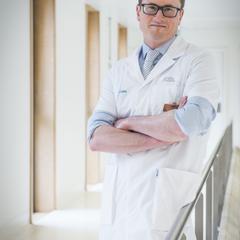Bacteria becoming resistant to antibiotics is one of today's biggest medical challenges. Which is why the interest for alternative way to fight off infections is on the rise. Bacteriophage therapy, which very accurately destroys damaging viruses, is a promising solution and was put in Belgian legislation in 2018. The past couple of years, UZ Leuven was able to successfully treat patients with serious bone infections.
Better control
In the meantime, the demand for a more central-oriented approach for bacteriophage therapy has increased. As a result the hospital and the KU Leuven have set up a coordination group for bacteriophage therapy Leuven (CBL) early 2021. This will ensure a structured care roadmap for phage therapy. This approach allows for a better control by the Federal Agency for Medicines and Health products (FAMHP). The CBL includes infectiologists, intensivists, hospital pharmacists, microbiologists, pulmonologists, surgeons and scientist. Every bacteriophage therapy application will now have to go through this umbrella coordination group.
Prof. dr. Willem-Jan Metsemakers, surgeon-traumatologist at UZ Leuven: “Bacteriophage therapy is becoming better known in Europe. We are getting a fair amount of requests from hospitals both nationally and abroad to have patients treated here. Which is logical, because this really is a classic example of highly-specialised care and this belongs in a university hospital. But hardly any European hospital has a structured care roadmap. UZ Leuven takes on its pioneering role by starting one of the first coordination groups for bacteriophage therapy in the world. The coordination group is vital to maintain an overview and to be able to guarantee safety. In addition we will, in time, be able to help more patients.”
Strict conditions
Recently the indications were broadened with a number of strictly defined infectious disease. The demand and waiting list for phage therapy is on the increase. For the time being, bacteriophage therapy is only possible if the patient meets a number of strict conditions. The CBL assesses the indications but also checks whether no other alternative standard treatments are still possible. Only when this is the case, the patient will qualify for phage therapy. For every patient that qualifies, the coordination will set up a treatment plan. In addition, the CBL will start a patient register to collect all data about the infection and the treatment in a standardised manner to ensure that scientific data on patient safety and efficacy can be studied transparently. UZ Leuven aims to include more disorders for bacteriophage therapy in the future. To this end, it works closely together with dr. Jean-Paul Pirnay of the Military Hospital Queen Astrid and prof. Rob Lavigne of the gen technology lab at the KU Leuven, both top of the league in European bacteriophage research.
UZ Leuven takes on its pioneering role with one the world's first coordination groups for bacteriophage therapy.
GPs and specialists that have questions about bacteriophage therapy can get in touch with the central CBL point of contactan: bacteriofaagtherapie@uzleuven.be.
Patients with questions about bacteriophage therapy can contact their GP or their attending physician.
